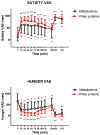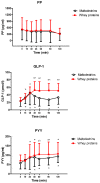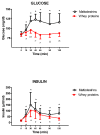Whey Proteins Reduce Appetite, Stimulate Anorexigenic Gastrointestinal Peptides and Improve Glucometabolic Homeostasis in Young Obese Women
- PMID: 30678029
- PMCID: PMC6412413
- DOI: 10.3390/nu11020247
Whey Proteins Reduce Appetite, Stimulate Anorexigenic Gastrointestinal Peptides and Improve Glucometabolic Homeostasis in Young Obese Women
Abstract
Introduction: Proteins, particularly whey proteins, represent the most satiating macronutrient in animals and humans. A dietetic regimen based on proteins enriched preload before eating might be a strategy to counteract obesity.
Aims and methods: The aim of the present study was to evaluate the effects of an isocaloric drink containing whey proteins or maltodextrins (preload) on appetite (satiety/hunger measured by a visual analogue scale or VAS), glucometabolic control (blood glucose/insulin), and anorexigenic gastrointestinal peptides (pancreatic polypeptide or PP, glucagon-like peptide 1 or GLP-1 and peptide YY or PYY) in a cohort of obese young women (n = 9; age: 18.1 ± 3.0 years; body mass index, BMI: 38.8 ± 4.5 kg/m²). After two and a half hours, they were administered with a mixed meal at a fixed dose; satiety and hunger were measured by VAS.
Results: Each drink significantly augmented satiety and reduced hunger, and the effects were more evident with whey proteins than maltodextrins. Similarly, there were significant increases in GLP-1 and PYY levels (but not PP) after the ingestion of each drink; these anorexigenic responses were higher with whey proteins than maltodextrins. While insulinemia identically increased after each drink, whey proteins induced a lower glycemic response than maltodextrins. No differences in satiety and hunger were found after the meal, which is presumably due to the late administration of the meal test, when the hypophagic effect of whey proteins was disappearing.
Conclusions: While whey proteins actually reduce appetite, stimulate anorexigenic gastrointestinal peptides, and improve glucometabolic homeostasis in young obese women, further additional studies are mandatory to demonstrate their hypophagic effects in obese subjects, when administered as preload before eating.
Keywords: amino acids; anorexigenic gastrointestinal peptides; appetite; glucose; insulin; maltodextrins; obesity; whey proteins.
Conflict of interest statement
The authors declare that there is no conflict of interest that could be perceived as prejudicing the impartiality of the research reported.
Figures




References
Publication types
MeSH terms
Substances
LinkOut - more resources
Full Text Sources
Medical
Miscellaneous

